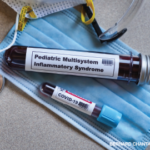NEW YORK (Reuters Health)—A new study of multisystem inflammatory syndrome in children (MIS-C) shows that the immune system is profoundly altered during acute illness, but gradually returns back to normal.
MIS-C is distinct from both COVID-19 and Kawasaki disease, but is associated with previous SARS-CoV-2 infection, the immunological profiling study reveals.
Dr. Manu Shankar-Hari, an NIHR Clinician Scientist at Guy’s and St Thomas’, London, tells Reuters Health by email, “The immune system changes [during treatment] highlight that there is excess inflammation. The treatments that are commonly administered, such as corticosteroid and intravenous immunoglobulins, appear to favorably alter the immune system changes.”
As reported in Nature Medicine, Dr. Shankar-Hari and colleagues performed peripheral leukocyte phenotyping for 25 children (median age: 12.5; 60% boys) with MIS-C, in the acute (23 patients; worst illness within 72 hrs of admission), resolution (14; clinical improvement) and convalescent (10; first outpatient visit) phases.1
At baseline, 72% had gastrointestinal symptoms, 28% had radiological evidence of pneumonia, 56% had vasoactive infusions and 28% had coronary artery dilatation or aneurysm. Among those with MIS-C, 17 (68%) were SARS-CoV-2 seropositive, suggesting previous SARS-CoV-2 infections; these children had more severe disease.
Comparing blood samples from affected children at each stage of the disease with samples from age-matched healthy controls, the authors observed high levels of cytokines in the acute phase of MIS-C—e.g., interleukin-1 beta, IL-6, IL-8, IL-10, IL-17, interferon-gamma—as well as T and B cell subset lymphopenia. These immune responses were similar to those observed in adults with COVID-19 infection.
Further, high CD64 expression on neutrophils and monocytes, and high HLA-DR expression on gamma delta and CD4+CCR7+ T cells in the acute phase suggested that these immune cells were also activated.
Low HLA-DR and CD86 expression was observed in antigen-presenting cells, potentially indicating impaired antigen presentation.
By the convalescent phase, these immune cell populations returned to normal. Taken together, the findings suggest that immune responses in MIS-C and adult COVID-19 patients share similarities as well as differences (e.g., in numbers of neutrophils), and that MIS-C is likely not the same as Kawasaki disease.
“Clinicians should be telling families that MIS-C is a rare illness and children get better with commonly administered treatments,” Dr. Shankar-Hari says. “We do not know why some children are getting this illness. Further research is underway to address that.”
Daphne Hsu, MD, division chief of Pediatric Cardiology at Children’s Hospital at Montefiore in New York City, comments in an email to Reuters Health, “The observations … support the general consensus that MIS-C is an immunologically mediated disease. The fact the abnormalities were most prominent in the acute phase and had for the most part completely resolved by the convalescent phase support clinical observations that MIS-C is a self-limited disease in the vast majority of patients.”



